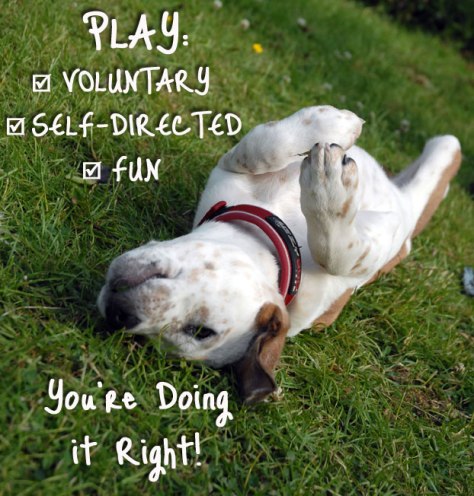This morning as I was lying on the floor wrestling with my dog for her tennis ball–complete with fake growling on my part and some real growling on her part–I realized how important play is in my life.
Still. At the age of 45.
Since childhood, I’ve enjoyed playing board games and card games, solving puzzles and competing at (some) sports. Basically if there’s a game and I can potentially win at it, or at least enjoy trying, I’m there. But I’m also a huge fan of spontaneous, unstructured, completely pointless play.
Play in its purest form.
Play that arises in the moment and leads to unexpected, unbridled fun.
Which is probably why the assertion that autistic children don’t play “right” is so offensive to me. Why have autism researchers and therapists and clinicians forgotten the meaning of play? Worse, why are autistic kids so often described as not understanding how to play?
In reality, there is no wrong way to play. According to that bastion of knowledge known as Wikipedia, play is “a range of voluntary, intrinsically motivated activities normally associated with recreational pleasure and enjoyment.” If a child is engaging in an intrinsically motivated activity and they’re enjoying it, then they’re doing it right!
The activity could be socially-focused, like having a tea party or goal-focused like disassembling a toaster. It could be something that appears to be completely pointless like watching a bug crawl on a stick or running in circles around the perimeter of the playground or studying the way the wind blows leaves around as they fall from a tree.

Educational Play
But, the experts say, play should be educational–it should promote cognitive, social and physical development.
Kids are little sponges, absorbing knowledge every moment of the day. Filling their growing brains with new and important skills, many learned through play. But does play always have to promote a child’s development? Of course not. Much of the play that typical kids engage in is pointless fun.
But those poor autistic kids, the experts intone somberly, with their delayed development and clueless approach to socializing–they need to suck up every possible ounce of learning from every waking moment.
Thanks to this attitude–to the experts who have forgotten not only what play is supposed to be but what it’s like to be a child–autistic kids get social skills training disguised as play and developmental activities disguised as play and behavioral interventions disguised as play and occupational therapy disguised as play . . .
Except that these things aren’t play at all, because they’re not intrinsically motivated. The child is not directing the activity. The child is not choosing how to fulfill their needs or create enjoyable recreational activities. The child isn’t exploring the world around them in a way that suits them. They’re not discovering their passions and likes and dislikes.
They’re being led by an adult in a structured activity that has the goal of producing desired outcomes for which the child will receive extrinsic rewards. That’s the opposite of play. In fact, that’s the dictionary definition of work.
It’s commendable that clinicians and therapists want therapy to be fun for kids, but interventions disguised as play are a poor–if not a dangerous–substitute for actual play. Autistic kids have the same rights to a childhood as other children. Therapies and supplemental educational activities should be done in addition to playtime, not in place of it.

More Than One Way to Play
Somewhere along the line we’ve taken the notion that play is a valuable educational activity and twisted it to mean that one specific type of play is valuable and all play–especially all play engaged in by developmentally disabled children–must be educational.
This is bit like saying “doctors are valuable to society therefore all adults should be doctors.” If that were the case, we would all quickly starve and/or freeze to death because we would be homeless, hungry, and naked, among other things.
Society needs all kinds of people. It needs the kids who play house and school and tea party. And it needs the kids who take apart their toys or categorize their toys or couldn’t care less about conventional toys. It needs the kids who enjoy staring at clouds and the kids who would rather figure out the iPad by themselves than ask a parent and the kids who are content to spend their recess period digging in the dirt with a stick.
Notice that I didn’t say we need the kids who play in social ways but we also need the kids who play in other ways. I said and. This is an intentional word choice. The kids who play in goal-oriented, atypical or apparently pointless ways are equally valuable members of society. They are not the “but also” group, tacked on to the end of the sentence like second class citizens.
I was the kid who spent hours organizing her toys. I was the kid who wandered aimlessly in the woods. I was the kid playing board games alone in her room. By all accounts, I spent my entire childhood playing “wrong.” The funny thing is, nobody told me. My parents encouraged my interests, no matter how odd they were for my age. I learned to follow my passions and I learned to approach the world with curiosity.
That’s true to this day and that’s far more important to me than whether I make small talk properly. I wouldn’t trade my intrinsic motivation, my passion for self-directed learning or my love of discovery for all the social skills in the world. As a child, I intrinsically knew what I needed to learn; through play I built up the skills that have seen me through adulthood.
Because autistic children perceive the world differently, they need to learn different things through play than typical children do. All those hours I spent organizing my stamps and coins and baseball cards and Barbie clothes taught me about pattern recognition and rules–two things that I rely heavily on to navigate the world. Time spent alone in the woods taught me that quiet solitude is essential to surviving in a world that is unnaturally noisy to my senses. Hours of board games played against myself taught me about options and strategies and roleplaying and the countless ways a situation can be approached and still turn out okay.
We are born with an incredibly strong intrinsic motivation for exploring and adapting to the world around us. Forcing an autistic child to play in a certain way not only takes aways their intrinsic drive for exploration, it prevents them from discovering their strengths and finding ways to cope with the complex and often confusing world around them.









